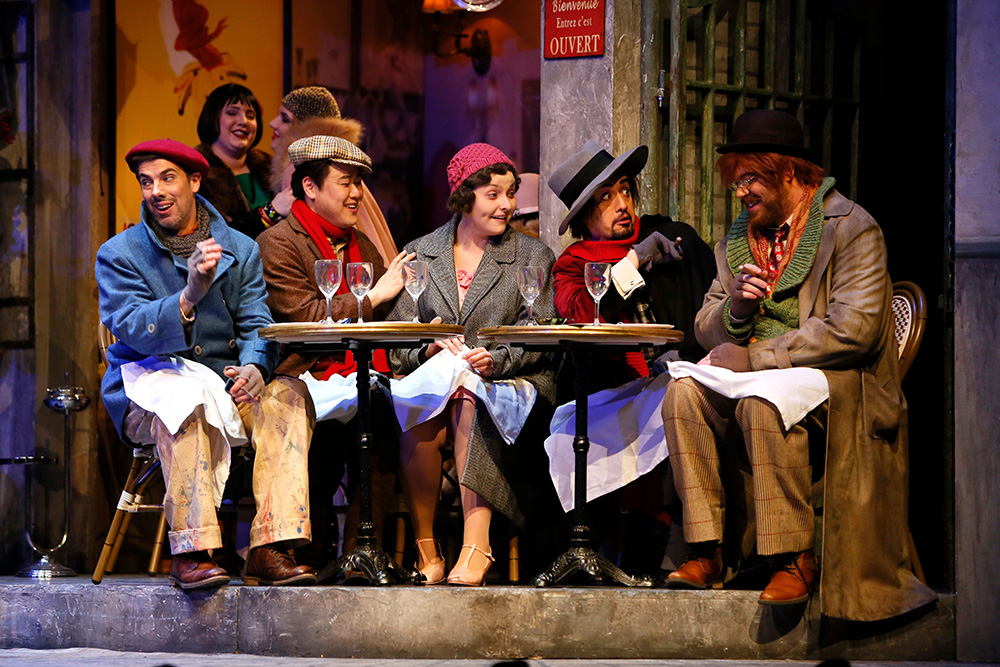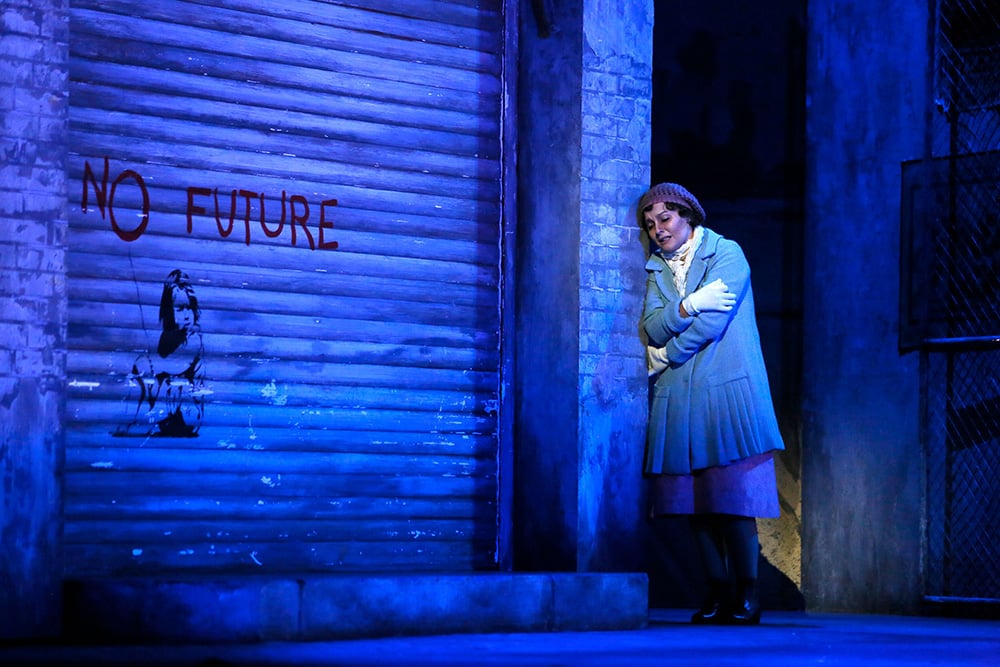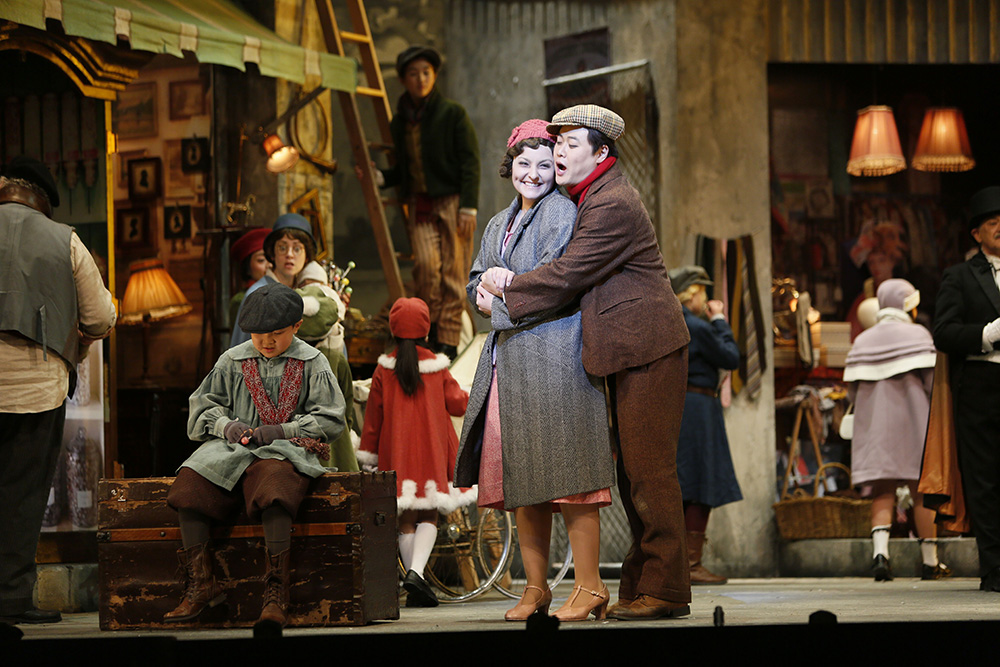Starving artists living hand to mouth in crappy apartments, selling their possessions in order to get by, living with multiple roommates, drinking too much and never eating properly.
This isn’t Vancouver, but Paris in the 1840s, the setting for Puccini’s opera La Bohème. The Vancouver Opera’s new production of the classic work opened, fittingly enough, on Valentine’s Day. After all, it’s a love story.
But why should we modern folks care about an opera about some Parisian characters who live, love and suffer in a tiny cold garret? Perhaps because not much has changed since Puccini wrote his masterwork. Artists are still poor, and housing is an ongoing nightmare. What’s romantic and gauzy in operatic form is considerably less fun in real life. At times Puccini’s work takes on almost painful synergies, as people are pushed into more precarious positions and the toll comes due in terms of housing, health and suffering.
It’s not hard to look around Vancouver at the moment and see modern versions of Puccini’s young lovers struggling to survive in a hostile city. The opera has endured partly because there are universal ideas at play — that being young and impoverished necessitates creativity in order to survive, that relationships are hard and that poverty kills.

The Vancouver Opera polishes up Puccini’s old chestnut with a diverse cast, a powerful female conductor in Judith Yan and a few lovely conceits. Stage director Renaud Doucet and designer André Barbe have style to burn, and they are deeply thoughtful about what it means to speak to a contemporary audience.
In this new production, the past and the present are melded together. The addition of an opening sequence set in the flea markets of Paris is particularly compelling. A woman battling cancer finds an old postcard and is transported through time to a tiny Parisian garret where four young artists live.
Rodolfo (J-Min Park), a poet, and his friend Marcello (Phillip Addis), a painter, share space with Schaunard the musician (Geoffrey Schellenberg) and Colline the philosopher (Neil Craighead). The quartet makes up a cross-section of the bohemian lifestyle. They can barely feed themselves or keep a fire going, but they’re full of big dreams of artistic glory and dedicated to their respective crafts.
One evening there is a gentle tap at the door. Mimi (France Bellemare), a seamstress who lives upstairs, has accidentally blown out her candle and asks for help. She drops her key and, without any light, she and Rodolfo are forced to fumble around the floor until their hands touch in the darkness. Hola! It is love, the instant, obliterating kind that wrecks your life.
This chance meeting sets the stage for two of the most famous arias in the opera. In the dark, cold apartment, the two tell each other who they really are. He’s a poet; she’s an artist. They are twin souls reunited. Even as Rodolfo’s friends are calling from the street below, he asks Mimi to come with him, and just like that two become one.
This being an opera, love and tragedy run together. The couple is forced apart, supposedly due to his jealousy, but in reality the breakup is prompted by her declining health. She promises to stay with him during the depths of winter and leave in the spring when the warmth of the sun provides a renewal.
They part ways, and well, I won’t tell you the rest. Just get a ticket and bring tissues.

In order to keep up with social and cultural evolution, older art forms have to adapt. But for every operatic production that goes horribly off the rails, setting Tosca in a slum or dressing up Wagnerian Valkyries as sex workers, there are others that blend old and new elements into a seamless whole.
Puccini took inspiration from Henri Murger’s series of stories entitled Scènes de la vie de bohème. Murger’s work was largely based on people he knew in the Latin quarter of Paris. The stories drew little attention until they were transformed into a play. The theatrical adaptation sparked renewed interest and eventually the attention of Puccini. And thus was born one of the most beloved operas of all time.
Revisiting La Bohème in advance of the Vancouver Opera’s production, I was surprised how much is packed into a relatively simple story. I don’t listen to it very often because it makes me cry. Not decorous tears, but great ugly open-mouthed sobs that leave me wrecked and with a headache afterwards.
Some things remain timeless — love, passion and people screaming that the rent is too damn high. Actually that very thing occurs in the opening act of La Bohème as the penniless artists manipulate their landlord into revealing his romantic indiscretions and then cast him out in mock horror, forgetting to pay their backdated rent in the melee.
Other productions have updated details, changing consumption to AIDS, but what most endures is young people living and dying in the margins of the city, little mourned and little noticed.
Colleen Maybin, the Vancouver Opera’s director of education and community engagement, said the production has incorporated a number of aspects that reflect the reality of Vancouver — cultural diversity and yes, nowhere affordable for artists to live or work.
“Puccini was composing about real people, and his work is relevant in the way that Shakespeare still speaks to contemporary experience. These conversations have been happening for 200 years. Previously opera dealt with elite people, but Puccini was writing about real people and real struggle,” Maybin said.
The production is designed to be accessible, with multiple voices that are representative of Vancouver. But sometimes the city isn’t looking so great, as the number of tents and folk huddled under sleeping bags continues to grow.
The City of Vancouver has launched a number of initiatives to look at the problem, from the Creative City Strategy to Mayor Kennedy Stewart’s plan to build more live/work spaces to help artists survive in the city. But whether any of the recent studies, plans or panel discussions will have much of an impact remains to be seen.
Meanwhile on Vancouver’s mean streets, any number of operatic tragedies are likely unfolding. In this production of La Bohème, when Mimi seeks her lover after a quarrel, she wanders through a modern, degraded section of Paris. Graffiti coats the walls, there’s garbage everywhere and people are desperate. It reminded me a lot of Vancouver.
As rents get higher than a soprano can sing and creative people continue to leave the city, things get sadder. It’s enough to make you cry, and that’s where an opera like La Bohème is most piercingly sharp. Operas don’t have happy endings. ![]()
Read more: Rights + Justice, Media
















Tyee Commenting Guidelines
Comments that violate guidelines risk being deleted, and violations may result in a temporary or permanent user ban. Maintain the spirit of good conversation to stay in the discussion.
*Please note The Tyee is not a forum for spreading misinformation about COVID-19, denying its existence or minimizing its risk to public health.
Do:
Do not: